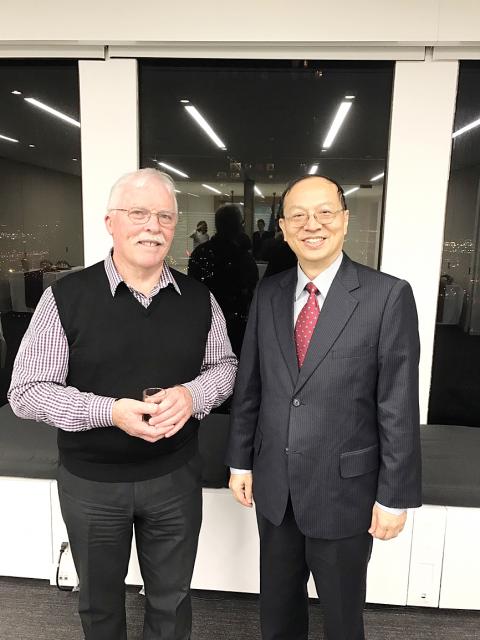A Taiwan non-governmental organization (NGO) dedicated to the treatment of rare diseases was barred from a UN-affiliated meeting in New York because of a protest from China.
Taiwan Foundation for Rare Disorders chairman Tseng Min-chieh (曾敏傑) was invited to the NGO Committee for Rare Diseases launch on Friday to talk about how Taiwan can contribute to the UN’s 2030 Agenda for Sustainable Development.
However, Swedish National Competence Centre for Rare Diseases president Robert Hejdenberg told Tseng one hour before the meeting that he would not be able to deliver his speech because of an objection from Beijing, the foundation said in a statement.

Photo provided by Taiwan Foundation for Rare Disorders
The foundation quoted a letter from the meeting’s cohost, European Organisation for Rare Diseases chief executive Yann Le Cam, saying: “We are all outraged and feel awful for today’s difficulties.”
The Ministry of Health and Welfare yesterday condemned China’s behavior as “very unreasonable.”
Taiwan will try to attend as many international organizations or conferences as possible, especially on issues such as healthcare and human rights, Health Promotion Administration Director Wang Ying-wei (王英偉) said on behalf of the ministry.
Taiwan has put much effort into taking care of minority groups throughout the years and places a high value on human rights, he said, adding that the speech had nothing to do with politics, but was about universal human rights.
“We cannot even make a speech, which highlights Beijing’s very unreasonable attitude,” Wang said. “However, we still reached out and at least it showed the world our healthcare achievements, and how unreasonably we are treated.”
During the meeting, Conference of Non-Governmental Organizations in Consultative Relationship with the UN (CONGO) president Cyril Ritchie said: “CONGO regrets that one of the speakers of today’s program was not able to enter UN headquarters. I refer to professor Tseng Min-chieh, founder of the Foundation and dean of Social sciences at National Taipei University.”
“CONGO by definition is a proponent of freedom of information, freedom of expression and the open exchange of scientific and professional knowledge. The prevention of professor Tseng from Taiwan from attending today’s CONGO meeting runs directly counter to these fundamental principles; principles that are clearly within the values proclaimed in the UN Charter,” he said.
The Ministry of Foreign Affairs said it is sorry that Taiwan could not attend a meeting where the goal is to enhance relationships among medical non-governmental organizations and the UN.
The Taipei Economic and Cultural Office in New York contacted Tseng immediately after the incident to learn more about the incident and provide assistance, it said.
Additional reporting by Peng Wen-hsin

The Taiwanese passport ranked 33rd in a global listing of passports by convenience this month, rising three places from last month’s ranking, but matching its position in January last year. The Henley Passport Index, an international ranking of passports by the number of designations its holder can travel to without a visa, showed that the Taiwan passport enables holders to travel to 139 countries and territories without a visa. Singapore’s passport was ranked the most powerful with visa-free access to 192 destinations out of 227, according to the index published on Tuesday by UK-based migration investment consultancy firm Henley and Partners. Japan’s and

NATIONAL SECURITY THREAT: An official said that Guan Guan’s comments had gone beyond the threshold of free speech, as she advocated for the destruction of the ROC China-born media influencer Guan Guan’s (關關) residency permit has been revoked for repeatedly posting pro-China content that threatens national security, the National Immigration Agency said yesterday. Guan Guan has said many controversial things in her videos posted to Douyin (抖音), including “the red flag will soon be painted all over Taiwan” and “Taiwan is an inseparable part of China,” while expressing hope for expedited “reunification.” The agency received multiple reports alleging that Guan Guan had advocated for armed reunification last year. After investigating, the agency last month issued a notice requiring her to appear and account for her actions. Guan Guan appeared as required,

Japan and the Philippines yesterday signed a defense pact that would allow the tax-free provision of ammunition, fuel, food and other necessities when their forces stage joint training to boost deterrence against China’s growing aggression in the region and to bolster their preparation for natural disasters. Japan has faced increasing political, trade and security tensions with China, which was angered by Japanese Prime Minister Sanae Takaichi’s remark that a Chinese attack on Taiwan would be a survival-threatening situation for Japan, triggering a military response. Japan and the Philippines have also had separate territorial conflicts with Beijing in the East and South China

A strong cold air mass is expected to arrive tonight, bringing a change in weather and a drop in temperature, the Central Weather Administration (CWA) said. The coldest time would be early on Thursday morning, with temperatures in some areas dipping as low as 8°C, it said. Daytime highs yesterday were 22°C to 24°C in northern and eastern Taiwan, and about 25°C to 28°C in the central and southern regions, it said. However, nighttime lows would dip to about 15°C to 16°C in central and northern Taiwan as well as the northeast, and 17°C to 19°C elsewhere, it said. Tropical Storm Nokaen, currently